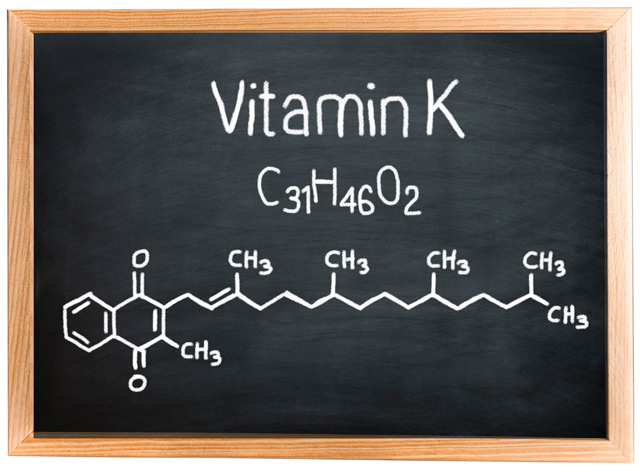How Vitamin K Works

Vitamin K activates or modifies a number of proteins that influence physiological processes. The most well-known vitamin K function involves blood clotting, but new areas of research are emerging as more vitamin-K dependent proteins are identified. The roles of many of these newly recognized proteins are not yet understood.(21)
Current knowledge about vitamin K suggests that its effects seem to fall into one of two broad categories - either Gla protein or non-Gla functions. However, while some functions of vitamin K have been researched for decades, many of the biological activities and effects of the various forms of vitamin K are still not understood. Research is ongoing and new discoveries about vitamin K appear regularly in scientific journals.(21-22)
Gla Proteins
Vitamin K works in conjunction with the enzyme γ-glutamyl carboxylase to modify certain proteins so they can bind to calcium. This process is called carboxylation, and the proteins are referred to as vitamin K-dependent; once carboxylated these proteins are called Gla proteins. Carboxylation converts glutamic acid residues on these proteins to gamma-carboxyglutamic acid (Gla). Vitamin K-dependent proteins involved in coagulation are called clotting factors.(2, 4)
Bone Gla Proteins
Another known group of Gla proteins are called bone Gla proteins -- protein S, osteocalcin (OC), and matrix Gla protein (MGP). All three play a role in mineralized tissues (e.g., bone, teeth, and cartilage), but protein S and MGP also appear in soft tissue.(22)
OC continues to be extensively studied for its role in bone health since diets low in vitamin K have been linked to increased fracture risk. MGP is found in cartilage and artery walls, and dysfunctional regulation of MGP levels (both too high and too low) is linked with syndromes involving cartilage calcification, atherosclerosis, and type 1 diabetes. Protein S is also considered a clotting factor when involved in blood coagulation, but appears to play a role in bone health as well.(22)
Other Gla Proteins
Gas6, a newer vitamin K-dependent Gla protein identified in 1993, appears to help regulate cell growth. It is important to cell adhesion, cell proliferation, and protection against cell death.(4, 22-23)
Gas6 interacts with protein receptors on cells called tyrosine kinases (also known as TAM receptors). Similar to protein S (one of the vitamin K-dependent clotting factors), Gas6 is believed to have important biological effects on:(4, 22-23)
Less-known Gla proteins exist in various tissues and organs, but there functions are mostly undetermined:(22)
- Nephrocalcin (in the kidney)
- Atherocalcin (plaque Gla protein; may be the same as MGP)
- PRGP-1 (in the spinal cord)
- PRGP-2 (in the thyroid gland)
Non-Gla Activity
Brain. Vitamin K is believed to be involved in metabolizing sphingolipids, which are prevalent in the brain. They are vital to the structure of brain cell membranes and are major signaling molecules.(24)
Each brain region has its own specific type of sphingolipid, suggesting specific activities related to different brain region functions. Vitamin K-dependent enzymes are important to regulating the distribution of sphingolipids to the appropriate area of the brain.(24)
Cell Proliferation. Evidence from recent studies suggests that growth and metastasis of some types of cancers are inhibited when they are deprived of vitamin K. A link between warfarin use and a lower occurrence of tumors has also been noted. This has led some researchers to speculate that vitamin K may indirectly promote cancer since warfarin counteracts vitamin K. However, the vast majority of research suggests that vitamin K may have anti-cancer effects, at least in part by inhibiting certain proteins.(22, 25)


